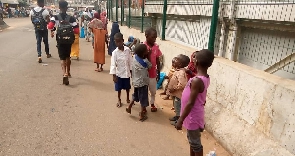 File photo: The phenomenon has been difficult to curb
File photo: The phenomenon has been difficult to curb
Director for Social Welfare and Community Development in the Kumasi Metropolis, Mrs Esther Apraku has urged pedestrians and commuters to desist from giving money to the beggars to gradually put a stop to the spate of begging on the streets.
She stated that "so far as there are givers, the number will continue to increase".
Mrs Nyarko noted in an interview with Elisha Adarkwah that the beggars prefer begging on the street with their children to engaging in petty trading and sending their children to school because they see begging as a "lucrative business" as compared to trading since they earn more money from it.
She also noted that "I realised that enforcement of the law is not very prominent when they [foreign beggars] come, they are free to engage in the begging, they are not arrested, nobody is running after them, they are not prosecuted, there are no deterrent measures, so, I think all these are contributing".
A lot of measures, she said, have been outlined to curtail the problem as the social welfare in the region led by the regional director has started stakeholders engagement and brainstorming on how they can play their roles to address the problem.
Mrs Nyarko said they would also need resources to screen the beggars and resolve their individual needs so that they can be flushed out of the streets.
She advised parents to prioritise sending their wards to school instead of sending them to the streets to beg for alms since it exposes them to other social vices.
Hundreds of foreign and local child beggars have taken over the streets of Kumasi, the Ashanti regional capital, begging for alms.
The migrant beggars especially from Niger, usually aged between at least 2 to 5 years, chase passers-by and motorists and beg them earnestly for money.
The beggars are mostly found in vantage points, streets and market areas including Kejetia, Amakom roundabout, Adum, in front of the Kumasi Zoological Garden, among others.
Most often, some of their parents are seen hanging around to take the proceeds from the begging, although the United Nations (UN) Convention on the Rights of the Child and section 87 (1-2) of the Children's Act, 1998 (Act 560) says child begging is child abuse.
In the face of the coronavirus pandemic, most of these juvenile beggars are seen without face masks, exposing them to threats of contracting the virus and spreading it to others.
The alms-begging phenomenon is not exclusive to children. Some adults are also engaged in the act.
While some of the adults either with some forms of deformity go around market centres begging for alms, others are also seen sitting along the streets and road side.
A 58-year-old Nigerian "handicapped" alms-beggar at Amakom roundabout, Osman Mohammed, told Kumasi FM's Elisha Adarkwah that he has to beg for money to survive with his eight children.
Mohammed claimed he had a road crash 12 years ago and lost his arms as a result.
Unhappy with the phenomenon, some passers-by and motorists who spoke to Elisha Adarkwah called the government and the authorities responsible to intervene and take immediate steps to evacuate the beggars from the streets.
They noted that the act is a disgrace to the nation especially those found at the entrance to the Kumasi Zoological Garden, a tourist centre in the heart of the regional capital.